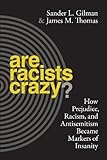Are racists crazy? : how prejudice, racism, and antisemitism became markers of insanity / Sander L. Gilman and James M. Thomas.
Material type: TextSeries: Biopolitics (New York, N.Y.)Publisher: New York : New York University Press, [2016]Copyright date: ©2016Description: 1 online resourceContent type:
TextSeries: Biopolitics (New York, N.Y.)Publisher: New York : New York University Press, [2016]Copyright date: ©2016Description: 1 online resourceContent type: - text
- computer
- online resource
- 9781479894758
- 1479894753
- Prejudices -- Psychological aspects
- Racism -- Psychological aspects
- Antisemitism -- Psychological aspects
- Mental illness
- Préjugés -- Aspect psychologique
- Racisme -- Aspect psychologique
- Antisémitisme -- Aspect psychologique
- Maladies mentales
- mental disorders
- SOCIAL SCIENCE -- General
- Antisemitism -- Psychological aspects
- Mental illness
- Prejudices -- Psychological aspects
- Racism -- Psychological aspects
- 303.3/85 23
- BF575.P9 G55 2016eb
| Item type | Home library | Collection | Call number | Materials specified | Status | Date due | Barcode | |
|---|---|---|---|---|---|---|---|---|
 Electronic-Books
Electronic-Books
|
OPJGU Sonepat- Campus | E-Books EBSCO | Available |
Includes bibliographical references and index.
Introduction -- Psychopathology and difference from the nineteenth century to the present -- The long, slow burn from pathological accounts of race to racial attitudes as pathological -- Hatred and the crowd: World War I and the rise of a psychology of racism -- The Holocaust and post-war theories of antisemitism and racism -- Race and madness in mid-twentieth-century America and beyond -- The modern pathologization of racism -- Conclusion: the specter of science in twenty-first-century racial discourse.
"In 2012, an interdisciplinary team of scientists at the University of Oxford reported that -- based on their clinical experiment -- the beta-blocker drug, Propranolol, could reduce implicit racial bias among its users. Shortly after the experiment, an article in Time Magazine cited the study, posing the question: Is racism becoming a mental illness? In Are Racists Crazy? Sander Gilman and James Thomas trace the idea of race and racism as psychopathological categories, from mid-19th century Europe, to contemporary America, up to the aforementioned clinical experiment at the University of Oxford, and ask a slightly different question than that posed by Time: How did racism become a mental illness? Using historical, archival, and content analysis, the authors provide a rich account of how the 19th century 'Sciences of Man' -- including anthropology, medicine, and biology -- used race as a means of defining psychopathology and how assertions about race and madness became embedded within disciplines that deal with mental health and illness. An illuminating and riveting history of the discourse on racism, antisemitism, and psychopathology, Are Racists Crazy? connects past and present claims about race and racism, showing the dangerous implications of this specious line of thought for today"--Provided by publisher.
Print version record.
eBooks on EBSCOhost EBSCO eBook Subscription Academic Collection - Worldwide
There are no comments on this title.

